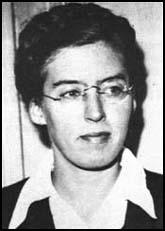Hélène Viannay

Hélène Mordkovitch was born in Paris, France, in 1917. Her mother had been a doctor working in Russia. Her father, a journalist, returned to Russia after her birth.
Hélène was a student in physical geography but to help her fund her studies worked as a librarian at the laboratory in the Sorbonne.
After the French government surrendered in 1940 Hélène joined other students at the university in producing a clandestine newspaper, Défense de la France. A total of 5,000 copies of the first issue appeared in August 1941.
Hélène was in charge of the machine that printed the newspaper and she kept it hidden in the physical geography laboratory. She also took charge of distribution. A total of 47 clandestine issues of the paper appeared over the next three years.
In 1942 Hélène married Philippe Viannay, one of the editors of the newspaper. Circulation gradually increased and over 450,000 were printed in January, 1944. This was the largest circulation of all clandestine newspapers published in France.
After the Second World War Hélène and Philippe Viannay ran Les Glénans, a sailing school in South Brittany. Philippe Viannay died in 1986. After his death Hélène became president of the association of Ancient Résistants of Défense de la France.
The entry is based on an interview with Hélène Viannay in December, 2002.
Primary Sources
(1) Maurice Buckmaster, Specially Employed (1952)
It has been customary, since the war, to blame the Maquis for every misfortune and hardship that France has now to undergo. It is almost an unpopular thing in France in 1952 to have fought for France's liberation in 1940-45. And if one fought and perhaps died in company with British officers, it is now considered almost unpardonable. None of the 'best people' did it. Of course, they were not collaborationists - nor supporters of Petain - just the best type that waited to see what would happen. I wonder what, in fact, would have happened if all these brave men and women who continually risked life and property to save our liaison officers had waited on the fence?
